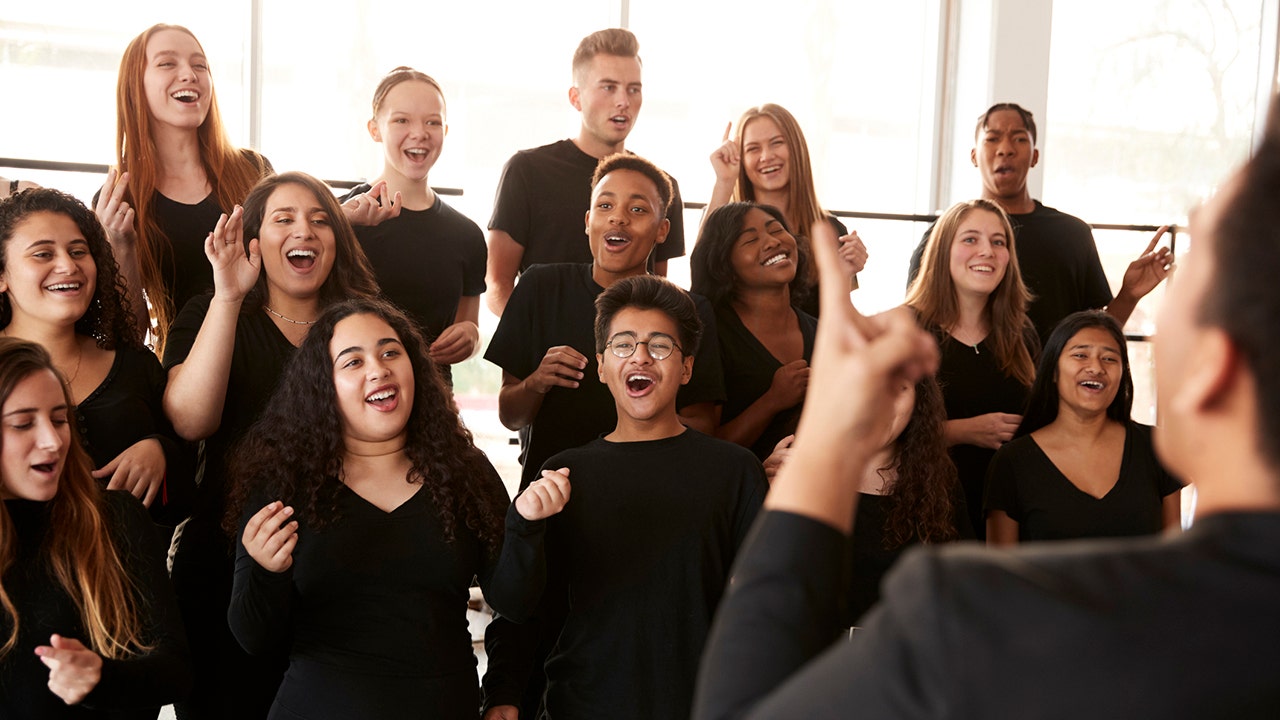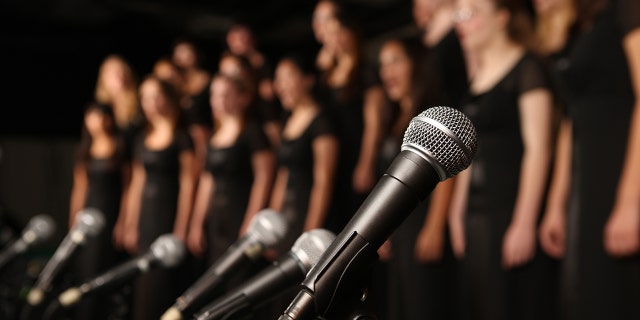Health
Singing with others for health and wellness: It can ‘renew the spirit and adjust the mindset’

A growing body of research indicates that music can be a form of therapy — especially singing with others — to improve your mental health.
But it’s OK if you are not the next “American Idol.”
Music therapy addresses symptoms across a wide range of illnesses, including chronic pain, anxiety disorders, cancer and lung diseases like asthma, COPD and COVID-19, said Joanne V. Loewy, director of The Louis Armstrong Center for Music and Medicine at Mount Sinai in New York City.
IV THERAPY CRAZE HAS AMERICANS PUMPING VITAMINS INTO THEIR VEINS: RESULTS ARE ‘PRETTY DRAMATIC’
It also benefits the pediatric population and the very young in neonatal care.
“Singing, in particular, is integrated to enhance well-being in children and teens facing fragility and/or depression,” Loewy also Fox News Digital in an email.
Male And Female Students Singing In Choir With Teacher At Performing Arts School (iStock)
Tenovus Cancer Care, a leading charity in England that provides support to those affected by cancer, started “Sing with Us” choirs as a fun way to unite people to reduce anxiety, make new friends and lift spirits.
The idea sprouted from a resoundingly positive response from a team-building exercise that organized a staff choir.
The group decided to set up a singing choir for those fighting cancer; it would be a research study to evaluate the benefits of singing. After receiving positive results in the study, they applied for funding to create more choirs in 2011.
Research explored how singing in a choir can improve well-being over time.
There are now choirs across the country, including a virtual one — people can join from around the world, per its website.
EXERCISE OF ANY AMOUNT COULD HELP INCREASE PAIN TOLERANCE, NEW STUDY FINDS
They sing a wide range of contemporary music, including hit songs from iconic musicians like Queen, Elvis, Rihanna, The Beach Boys and Adele, the website added.
Singing improves quality of life
Early research discovered that singing in choirs increased quality of life and reduced depression and anxiety.
Later research explored how singing in a choir can improve well-being over time, starting in 2016.

A group of elementary school students are shown singing in a music class. Singing helps “enhance well-being in children and teens facing fragility and/or depression,” said one health professional. (iStock)
Researchers compared two choir groups in London to a non-singing group across a period of 24 weeks.
The researchers found the singers who were caring for people with cancer had significant reductions in their levels of anxiety — especially when compared with the non-singing group.
They also found that singing really aided those who had low levels of well-being at the start of the study — a group the researchers thought needed the most help.
“I’ve headed home feeling rejuvenated, strengthened and empowered to face life.”
People who were grieving over the recent loss of a loved one also had more consistent levels of mental health compared to those who were not singing.
The non-singing group had increased levels of depression and more fluctuating levels of wellbeing throughout the course of the study.
Singing is empowering
“Many times, I’ve shown up for a rehearsal, physically and emotionally drained, stressed and overwhelmed,” a member of The Tabernacle Choir at Temple Square in Salt Lake City, Utah, told Fox News Digital.
“Then, 2½ hours later I’ve headed home feeling rejuvenated, strengthened and empowered to face life.”

While music brings people together, it is also a form of therapy, according to health professionals. (iStock)
The Grammy Award-winning and Emmy-winning Tabernacle Choir is known around the world for its unique sound, including its many memorable performances such as the opening ceremony of the 2002 Olympic Winter Games that billions watched globally.
“Just being with a large group of people who share my beliefs and motivations fortifies me — then taking it a step further and working together to create beautiful music as literal instruments renews my spirit and adjusts my mindset,” the member also said.
LIFE-CHANGING COLD THERAPY HELPS PENNSYLVANIA MOM WITH AWFUL BACK PAIN: ‘COULD PICK UP MY DAUGHTER’ AGAIN
Earlier this year, the U.S. surgeon general reminded people that seeking healthy relationships for “a source of healing and well-being” can help combat the ongoing epidemic of loneliness in this country.
‘Untapped resource’
While music brings people together, it is also a form of therapy.
“Music is a largely untapped resource, which can have powerful, positive effects on struggling patients,” Dr. Martin Rubin told Fox News Digital.
He’s the course director of a popular wellness elective for medical students in Elk Grove, California, which includes the appearance of special guest lecturers who share their unique perspective on what they do outside of medicine to stay healthy.

Julie Andrews portrays Maria von Trapp in a scene from the popular movie musical of 1965, “The Sound of Music.” (Getty Images)
One of those experts is Dr. Schery Mitchell, a retired pediatrician who finds happiness now with playing music; she is also based in Elk Grove.
“It’s fascinating to think that when you listen to music, one side of the brain is activated — but when you play an instrument or sing, the whole brain lights up,” she said.
CLICK HERE TO SIGN UP FOR OUR HEALTH NEWSLETTER
It was previously thought that music was processed only in the “right” part of our brain along with other creative processes such as art — but recent research has shown that music can be distributed throughout the brain.
Mitchell inspires students to appreciate the power of music with a famous quote from Plato.
“Music is a moral law,” the ancient Greek philosopher said. “It gives soul to the universe, wings to the mind, flight to the imagination, and charm and gaiety to life and to everything,” he continued.
“It is the essence of order, and leads to all that is good and just and beautiful.”

Health
Semaglutide Pills and Injections Vs. Drops: Experts Weigh In | Woman's World

Sign Up
Create a free account to access exclusive content, play games, solve puzzles, test your pop-culture knowledge and receive special offers.
Already have an account? Login
Use left and right arrow keys to navigate between menu items.
Use escape to exit the menu.
Health
Jennifer Hudson Lost 80-Lbs Without Depriving Herself—Learn Her Secrets

Sign Up
Create a free account to access exclusive content, play games, solve puzzles, test your pop-culture knowledge and receive special offers.
Already have an account? Login
Use left and right arrow keys to navigate between menu items.
Use escape to exit the menu.
Health
Kennedy’s Plan for the Drug Crisis: A Network of ‘Healing Farms’

Though Mr. Kennedy’s embrace of recovery farms may be novel, the concept stretches back almost a century. In 1935, the government opened the United States Narcotic Farm in Lexington, Ky., to research and treat addiction. Over the years, residents included Chet Baker and William S. Burroughs (who portrayed the institution in his novel, “Junkie: Confessions of an Unredeemed Drug Addict”). The program had high relapse rates and was tainted by drug experiments on human subjects. By 1975, as local treatment centers began to proliferate around the country, the program closed.
In America, therapeutic communities for addiction treatment became popular in the 1960s and ’70s. Some, like Synanon, became notorious for cultlike, abusive environments. There are now perhaps 3,000 worldwide, researchers estimate, including one that Mr. Kennedy has also praised — San Patrignano, an Italian program whose centerpiece is a highly regarded bakery, staffed by residents.
“If we do go down the road of large government-funded therapeutic communities, I’d want to see some oversight to ensure they live up to modern standards,” said Dr. Sabet, who is now president of the Foundation for Drug Policy Solutions. “We should get rid of the false dichotomy, too, between these approaches and medications, since we know they can work together for some people.”
Should Mr. Kennedy be confirmed, his authority to establish healing farms would be uncertain. Building federal treatment farms in “depressed rural areas,” as he said in his documentary, presumably on public land, would hit political and legal roadblocks. Fully legalizing and taxing cannabis to pay for the farms would require congressional action.
In the concluding moments of the documentary, Mr. Kennedy invoked Carl Jung, the Swiss psychiatrist whose views on spirituality influenced Alcoholics Anonymous. Dr. Jung, he said, felt that “people who believed in God got better faster and that their recovery was more durable and enduring than people who didn’t.”
-
/cdn.vox-cdn.com/uploads/chorus_asset/file/25822586/STK169_ZUCKERBERG_MAGA_STKS491_CVIRGINIA_A.jpg)
/cdn.vox-cdn.com/uploads/chorus_asset/file/25822586/STK169_ZUCKERBERG_MAGA_STKS491_CVIRGINIA_A.jpg) Technology1 week ago
Technology1 week agoMeta is highlighting a splintering global approach to online speech
-

 Science1 week ago
Science1 week agoMetro will offer free rides in L.A. through Sunday due to fires
-
/cdn.vox-cdn.com/uploads/chorus_asset/file/23935558/acastro_STK103__01.jpg)
/cdn.vox-cdn.com/uploads/chorus_asset/file/23935558/acastro_STK103__01.jpg) Technology1 week ago
Technology1 week agoAmazon Prime will shut down its clothing try-on program
-

 News1 week ago
News1 week agoMapping the Damage From the Palisades Fire
-
/cdn.vox-cdn.com/uploads/chorus_asset/file/25826211/lorealcellbioprint.jpg)
/cdn.vox-cdn.com/uploads/chorus_asset/file/25826211/lorealcellbioprint.jpg) Technology7 days ago
Technology7 days agoL’Oréal’s new skincare gadget told me I should try retinol
-
/cdn.vox-cdn.com/uploads/chorus_asset/file/25832751/2192581677.jpg)
/cdn.vox-cdn.com/uploads/chorus_asset/file/25832751/2192581677.jpg) Technology4 days ago
Technology4 days agoSuper Bowl LIX will stream for free on Tubi
-

 Business5 days ago
Business5 days agoWhy TikTok Users Are Downloading ‘Red Note,’ the Chinese App
-
/cdn.vox-cdn.com/uploads/chorus_asset/file/25835602/Switch_DonkeyKongCountryReturnsHD_scrn_19.png)
/cdn.vox-cdn.com/uploads/chorus_asset/file/25835602/Switch_DonkeyKongCountryReturnsHD_scrn_19.png) Technology2 days ago
Technology2 days agoNintendo omits original Donkey Kong Country Returns team from the remaster’s credits















